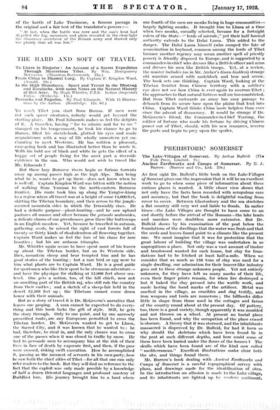THE HARD AND SOFT OF TRAVEL
To Lhasa in Disguise : An Account of a Secret Expedition Through Mysterious Tibet. By Wm. Montgomery McGovern. (Thornton Butterworth. -21s.) Peacocks and Pagodas. By Paul Edmonds. With 45 Illustra- tions by the Author. (Routlodge. 12s. 6d.)
To reach Tibet you. start from Burma. If men were not such queer creatures, nobody would get beyond the starting place. Mr. Paul Edmonds makes us feel the delights of it. A traveller, having " for to admire and for to see " stamped on his temperament, he took his chance to go to Burma, filled his sketch-book, glutted his eyes and made acquaintance with a way of life wholly unwestern yet en- chanting to most Westerns. He has written a pleasant, easy-going book and has illustrated better than he wrote it With his bold use of black and white he gets the effect of a happy set of people living for the most part a riverside existence in the sun. Who would not wish to travel like Mr. Edmonds ?
But these lazy Burmese rivers begin as furious torrents away up among passes high as the high Alps. Man being what he is, wants to get up there—does not know when he is well off. Captain Kingdon Ward was bitten with the notion of walking from Yunnan to the north-eastern Burmese frontier. His route took him up along the Yangtse-kiang to a region where all travel was at a height of some 14,000 feet, skirting the Tibetan boundary, and then across to the jungle- covered mountain sides in which the Irrawaddy rises. He had a definite purpose—plant-hunting—and he saw upland pastures all mauve and silver because the primula malacoides, a delicate charm of our greenhouses,grew there like buttercups in an English meadow. Yet, because he travelled in autumn, gathering seeds, he missed the sight of vast forests full of twenty or thirty kinds of rhododendron all flowering together. Captain Ward Makes us feel the lure of his chase for rare beauties ; but his are arduous triumphs.
Mr. Whistler again seems to have spent most of his leaves tip about the Tibetan border, but on its Western side. Ibex, mountain sheep and bear tempted him and he has good stories of the hunting ; but a rare bird or egg were to him what plants are to Captain Ward. He is a good guide for sportsmen who like their sport to be strenuous adventure— and have the physique for stalking at 15,000 feet above sea- level. One gets a notion, too, of the hill chiefs, now not an unwilling part of the British raj, who still rule the country from their castles ; and a sketch of a sheep-fair held in the desert 12,500 feet up ; the Tibetans cannot come down lower with their animals.
But as a story of travel it is Dr. McGovern's narrative that leaves one gasping. A man cannot be expected to do every- thing and this book lacks the gift of style. Still, he gets the story through. Only to one point, and by one narrowly prescribed route, are any Europeans permitted to cross the Tibetan border. Dr. McGovern wanted to get to Lhasa, the Sacred City, and it was known that he wanted to ; he had, therefore, to steal in, and the only chance was to cross one of the passes when it was closed to traffic by snow. He had to persuade men to accompany him at the risk of their lives in face of death by exposure first, and then, if the pass were crossed, risking swift execution. How he accomplished it, passing as the meanest of servants in his own party, how he saw both the chief cities of Tibet—for all that one can only refer readers to the book. But they will find no reference.to the fact that the exploit was only made possible by a knowledge of half a dozen Oriental languages and profound mastery of Buddhist lore. His journey brought him to a land where one fourth of the men are monks living in huge communities— largely fighting monks. It brought him to Lhasa at a time when two monks, casually selected, became for a fortnight rulers of the State—" lords of misrule," yet their half farcical authority extends to the Dalai Lama. This added to the danger. The Dalai Lama himself (who escaped the fate of assassination in boyhood, common among the lords of Tibet because another regency may mean another spell of priestly power) is friendly disposed to Europe, and is supported by a commander-in-chief who dresses like a British officer and arms and dresses his men like British troops. Yet, at a review, the muster includes (as in Mr. Archer's Green Goddess) strange old warriors armed with matchlock and bow and arrow. The book sets one thinking. Captain Ward, looking at the Tibetan frontier from Chinese territory with a soldier's eye does not see how China is ever again to overrun Tibet ; the approaches to that natural fortress wall are too constricted. But from Tibet eastwards an army has easy passage to debouch from its secure base upon the plains that lead into China. Captain Ward thinks China more helpless than ever since the advent of democracy. It would be strange if Dr. McGovern's friend, the Commander-in-Chief Tsarong, the soldier of fortune who made his fortune by driving Chinese power out of Tibet, should, with his new resources, reverse the parts and begin to prey upon the spoiler.










































 Previous page
Previous page